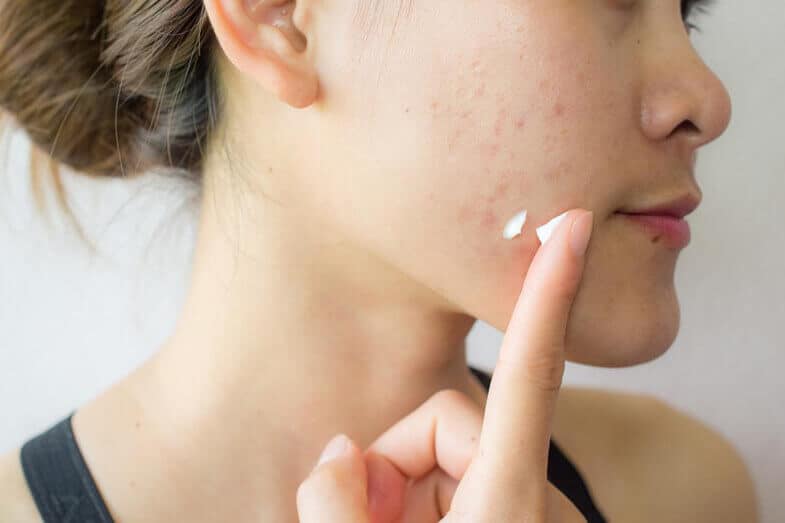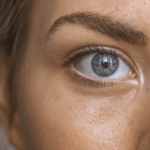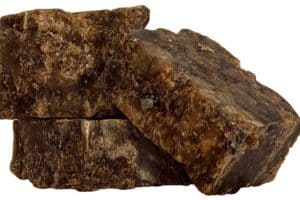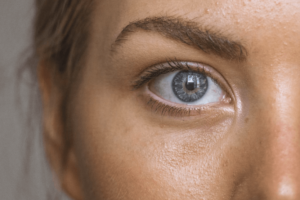There are so many uses for coconut oil, and it can be hard to know where to start. The one use I’ll focus on in this post is using coconut oil for old scars, particularly coconut oil for acne scars.
Use Coconut oil for old scars, including acne scars, burn scars, surgical scars, or leg scars. Coconut oil will keep the scar tissue hydrated, and its antifungal properties will protect the scar tissue from infection. Use caution on the face as coconut oil does clog pores which can cause breakouts.
I’ll share my personal experience with using coconut over many years, as well as give recommendations for how you can use it to help reduce your scarring. Read on to learn more about how to use coconut oil for old scars!
Coconut Oil for Old Scars – Acne and Other Scars
I use coconut oil on a regular basis, and my skin is normal-oily, or a combination of oily and dry. I know this because it gets a little dry during winter months when it’s really cold and when the heat is always, or something is wrong with my diet, or maybe I have overused a certain product that was bad for my skin, my skin can get really oily.
It is generally normal during the spring and then gets really oily during the hot, humid months, or if I don’t take proper care of it or if I don’t exfoliate it.
But I find coconut oil works perfectly fine for me. If your skin is similar, you should have similar results. Remember to not apply too much at first; just start by applying it to a small part of your face each day and check the results.
If it does not cause irritation, gradually expand to other parts of your face. For many people, they will see improvements in their old scars by using coconut oil, as they are reduced or minimized over time. You should also see it minimize wrinkles and help your skin to stay glowing and young-looking.
I found that after consistent use for about 2 weeks, acne scars will greatly minimize. Just apply it every day or every other day, as long as it does not irritate your skin. After 2 weeks, assess if the old scars look reduced and overall inflammation has gone down.
The below video is really great at giving out other insight and tips on using coconut oil for acne and old acne scars:
Start Slow and Small
In my DIY recipes, I am almost always using coconut oil for old scars, acne scars, leg scars, and even surgical scars. I’ve heard from many, however, that this is not the best oil to use because it is comedogenic. Comedogenic means it can cause blackheads by blocking the pores of the skin. Coconut oil does have comedogenic properties, but it does not cause blocked pores for everyone. It is a miracle solution for some, and for some others, it is not.
You cannot say that every person with acne scars will never be able to reduce them with coconut oil. Or that in the process of reducing them, they will clog their pores and develop blackheads. The same thing goes for if you buy a very expensive and popular product.
It can be an amazing lifesaver for some and be a disaster and complete waste of money for others. Keep in mind that I’m only talking about higher-end, 100% virgin, organic, unrefined coconut oil… not some cheap refined coconut oil.
Other Uses and Benefits for Coconut Oil on Your Body
As mentioned earlier, the coconut oil you want to buy is unrefined, extra-virgin oil that is certified organic. I use it almost every day as an all-over lotion. It’s amazing how coconut oil comes in a solid form, but when you touch it and heat it up with your hand, it turns into a liquid. So when you’re using it, just scoop out a little bit, place it in your hand, let it warm up a little bit, and it turns into a true liquid oil.
So how I moisturize with this is when I get on the shower, I scoop some out into the palms of my hands and rub it all over it absorbs quickly. My skin is super dry at the moment, so it is amazing for keeping it moisturized and well-hydrated. I also use it as a cuticle oil on my toes and all my fingers some nights.
If you have dry, dead skin on your legs or feet, see our post on how you can use coconut oil to solve this problem: Why Do I Have So Much Dead Skin On My Legs?
I also sometimes put it in my hair. I’ll just scoop out a teaspoonful, rub it through, and then wash it off. You can also work it into your scalp as well so do like a hot oil scalp treatment to prevent flakiness. Also, you can use it to tame frizz or smooth down the hair after styling.
My wife uses it sometimes as an eye makeup remover. She says it removes everything with ease. She first washes her face and will have leftover residue. She then takes her finger-size amount of coconut oil, smears it on a q-tip or a cotton ball, and then wipes off the rest of the makeup.
So not only are you removing your makeup, but the coconut oil stays behind as a treatment for your eyes like a natural eye serum. So that is another beneficial use of coconut oil – to use it as an eye cream.
If you like to have baths with an added product or bath salts, etc., try instead scooping out a couple of teaspoons of coconut oil and adding it to your bathwater. A little goes a long way. The heat will let it melt, and it makes a really luxurious bath oil. You shouldn’t even have to moisturize when you get out.
Coconut oil also makes an effective lip balm or chapstick to use every night before bed or in the morning before heading out in the cold.
See the below video for how to treat acne with coconut oil, which will also help with acne scarring:
Alternatives to Coconut Oil for Acne Scars

Coconut oil has been used especially in the tropics for thousands of years for hydration if you’re talking about coconut water, the cooking oil, and for the meat often used in smoothies today. Historically, it was actually called the tree of life because coconuts fed so many people with their high fats and high calories, which gives people energy, high-quality energy.
It was also used for centuries as a natural skin moisturizer. It has now seemed to grow in popularity each year, with more and more people wanting natural skin solutions over their chemical counterparts.
I’ve heard many people say coconut oil makes their skin redder and burns, whereas many others say it is the best thing for the skin, including reducing acne scars and keeping it well-moisturized. These mixed reviews can create confusion online.
Coconut oil has antifungal, antibacterial, and antimicrobial properties, so if you put it on your skin and your skin has bacterial or fungal issues or yeast issues, it’s going to feel a bit irritating..that actually means it’s working.
Now, if your skin really burns with coconut oil, then you should use something else, such as perhaps jojoba oil, shea butter, safflower oil, calendula oil, or make a mixture with aloe vera gel. If you will use a store-bought product, ensure it is fragrance-free, alcohol-free, and has minimal ingredients and chemicals. Ensure it is made for sensitive skin. Go for products labeled as “hypoallergenic.”
Castor oil is a potential alternative I recommend. It is very super sticky, but it will help pull the toxins out of your body and reduce the acne scars. Like coconut oil, castor oil is anti-inflammatory and will help clean the skin of harmful bacteria. With castor oil, apply only when chilling at home or maybe before bed and then wash it off before you sleep because it’s very thick. You don’t want to walk around with it on.
See the below video for different oils other than coconut oil that will help minimize or get rid of old scars, including old acne scars:
Final Thoughts on Coconut Oil for Old Scars
Just to end on a final story by a friend of mine who had really, really bad acne scarring all over her face. She tried several over-the-counter creams, lotions, ointments, scrubs, and nothing was working. She then went to her doctor and got a prescription, high-strength steroid creams, and ointments. These helped for a bit, but then after, the redness in her face came back, and she noticed her old scars were still there.
She then started using coconut oil, applying it each night before bed, and she saw a great improvement in the reduction of her acne scars. She was very surprised because she did not think it would be that easy. To this day, she used it as her daily moisturizer as well as a treatment at night, and it healed her acne and helped reduce the scarring. She still has some faint scarring, but it has made a dramatic difference.
If you have really bad acne, like maybe cystic acne, you can even mix this with a drop of tea tree oil. Tea tree oil is another natural antibacterial and antifungal oil. Like coconut oil, use tea tree oil for oily skin, dry skin, or combination skin.
Studies have actually shown that coconut oil is 15 times more beneficial than benzoyl peroxide. And it’s all-natural, so you don’t risk putting harmful chemicals on your skin. If you have acne-prone or acne scarring, I do recommend giving it a try. Some people said it made it worse, and some people said it healed it.
For me, my friend, and many others, it has been a life-changer. To this day, if I’m getting a bad breakout, I will just use my finger to get some and really focus it on where my breakouts are. It will then be gone within days. It helps to kill bacteria while at the same time moisturizing and protecting the skin from the environment.
Start with a small application, and gradually use more over time. Mix with some tea tree oil for a more powerful treatment. Put it on each night, and you should see an improvement in your skin. The redness and acne scarring should reduce quite a bit over time. If you don’t see an improvement or experience burning or strong irritation, switch to a different oil instead, such as jojoba oil, or try shea butter. I know how frustrating acne scars are. With patience and time, you can reduce them!
Related Questions
How do you use coconut oil for acne scars? The simplest instructions are as follows: 1. In the evening, before bed, wash your face, so it is clean and then dry. 2. Take about a 1/2 teaspoon of coconut oil and rub it in between your fingers; let it melt and get soft. 3. Gently massage the coconut oil on and around the acne scars. 4. Leave it on the skin overnight. 5. Wash your face like normal in the morning.
How long does it take to get rid of acne scars? Most medium-sized pimples, zits, or other blemishes take about a week to fully heal and disappear. Large pimples with deep pores will take longer.
Is it okay to leave coconut oil on the face overnight? Coconut oil works best if you leave it on the skin and don’t wash it off. Don’t apply too much to the face, just a thin layer, and then overnight, it will absorb into the skin. In the morning, wash your face off like normal.








